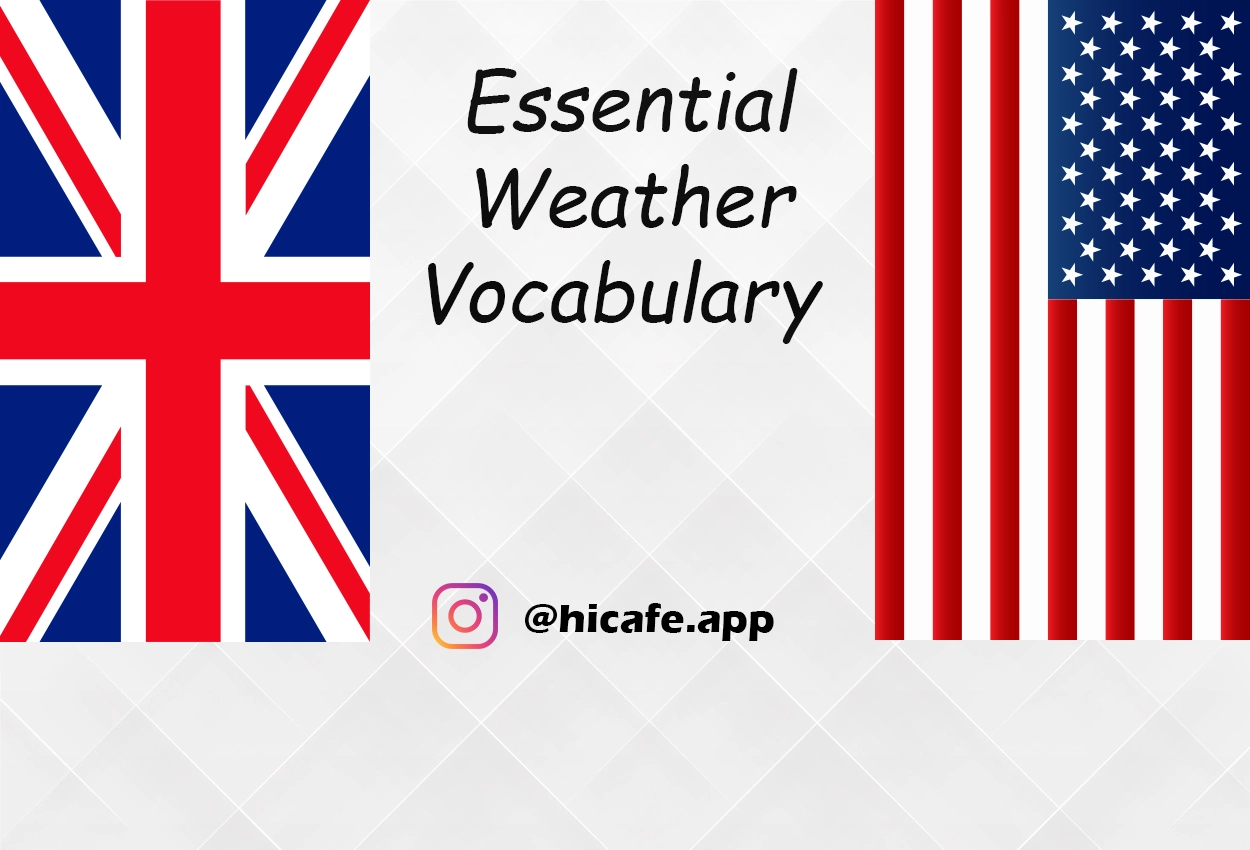
Weather in the UK can be quite unpredictable, with days that can transition from sunny to rainy in the blink of an eye. In this lesson, we will explore weather vocabulary in English related to different types of weather conditions and how we commonly discuss them.
Previous Conversation Tip Lesson
Different Ways to Refuse an Offer in English
Weather in English Vocabulary
Using it’s and there
We often use “It’s” as the subject of a sentence about weather.
- With an adjective: It’s freezing outside today.
- With a verb: It’s pouring rain this afternoon.
We can use “There” with a noun.
- There’s a strong wind blowing through the valley.
- There will be a sunny spell later in the week.
Weather adjectives
Here are some common adjectives to describe weather.
- Sunny: It’s sunny today, perfect for a picnic in the park.
- Hot: I enjoy hot weather because I can go swimming and soak up the sun!
- Cold: We experience cold winters here in New York, but I love cozying up with hot cocoa by the fireplace.
- Mild = when the weather isn’t cold: Spring is a lovely and mild season, great for outdoor activities like hiking.
- Fine = a word to mean “nice” when we describe the weather: It will be a fine, sunny day at the beach!
- Windy = when there’s a lot of wind: Be cautious outside, it’s very windy and your hat might blow away!
- Wet = when it rains a lot: The streets are wet from the rain, remember to bring an umbrella!
- Dry = when there’s no rain: The forecast predicts a long, dry summer ahead, perfect for outdoor BBQs.
- Cloudy: Today will be cloudy, a great day to stay indoors and watch movies.
- Overcast = when the sky is completely grey: It’s overcast and gloomy today.
- Misty = when there is low cloud in the morning: The morning is quite misty, creating a magical ambiance in the forest.
- Foggy = when you can’t see in front of you because there is low clouds:
It’s foggy today, so make sure to drive carefully and use your fog lights.
- Frosty = when it freezes overnight and the grass, etc is icy and white: It’s going to be a frosty morning tomorrow, time to bundle up in warm clothes!
- Icy = when it freezes and water turns to ice: Road conditions are icy this morning, so drive cautiously and watch out for slippery spots.
- Stormy: You can expect stormy weather in winter with thunder, lightning, and heavy rain.
Weather verbs
- Raining: It’s raining again, a perfect excuse to enjoy a cozy day indoors.
- Snowing: It’s snowing hard, time to build snowmen and have a snowball fight outside!
Weather nouns
Click here to practice this conversation tip in Instagram.
- Rain: Grab your umbrella, we expect rain later in the day.
You can also say “light rain”, “heavy rain”, or “showers” (rain that only lasts for a few minutes.)
- Sunshine = The weather forecast predicts plenty of sunshine later, so get ready to soak up some vitamin D!
- Fog: I don’t enjoy driving in fog due to limited visibility, so be cautious on the road.
- Mist: There’s often some mist in the early morning, creating a mystical atmosphere in the countryside.
- Ice: Be wary of the ice on the roads, it can be slippery and dangerous for driving.
- Snow: We had lots of snow last winter, creating a beautiful winter wonderland scene.
- Clouds = there are different types of clouds, such as rain clouds, snow clouds and storm clouds.
- Floods = when there’s too much rain and the fields or roads are covered in water: Last winter, there were numerous floods that covered fields and roads.
The adjective is “flooded”: All the roads are flooded.
The verb is “to flood”: The river flooded four times previous year.
- Storm = when you get heavy rain and strong winds, and maybe also thunder (noise) and lightning (electricity).
Other typical English weather vocabulary
Click here to practice this conversation tip in Instagram.
- Strong wind = when there is a lot of force or power in the wind
- Cold snap = when it is cold for a period of time.
- Dry spell = when it is dry for a period of time.
- Sunny spell = when it is sunny for a period of time.
- Partly cloudy = when there is both cloud and sunshine.
- A heat wave = when it is hotter than usual, for a long period of time.
- High temperatures (rising temperatures) = when it is hot.
- Low temperatures (falling temperatures) = when it is cold.
- Above / below freezing = when the temperature is above 0C or below 0C.
We also say “minus”. For example -2C is minus two.
Conclusion
From sunny spells to stormy days, understanding weather vocabulary is essential for daily conversations in English. Whether it’s a discussion about a cold snap or a heat wave, being able to describe the weather adds color and depth to our interactions. So next time you step outside, take a moment to appreciate the diverse weather patterns around you and the language we use to talk about them!
Next Conversation Tip Lesson
Making a Generalization in English
Related Conversation Lessons
None
Practice Conversation with HiCafe App
By using HiCafe App, you can join free discussion events and Practice English Conversation online or in-person and improve your verbal skills.
All Conversation Lessons
To see and read all of our conversation lessons, you can visit our Improve English Speaking Skills page.


